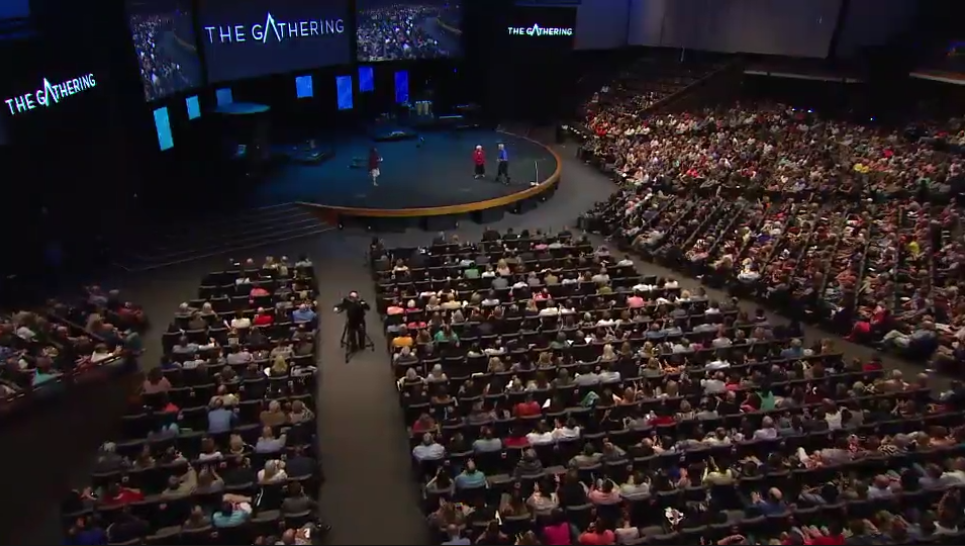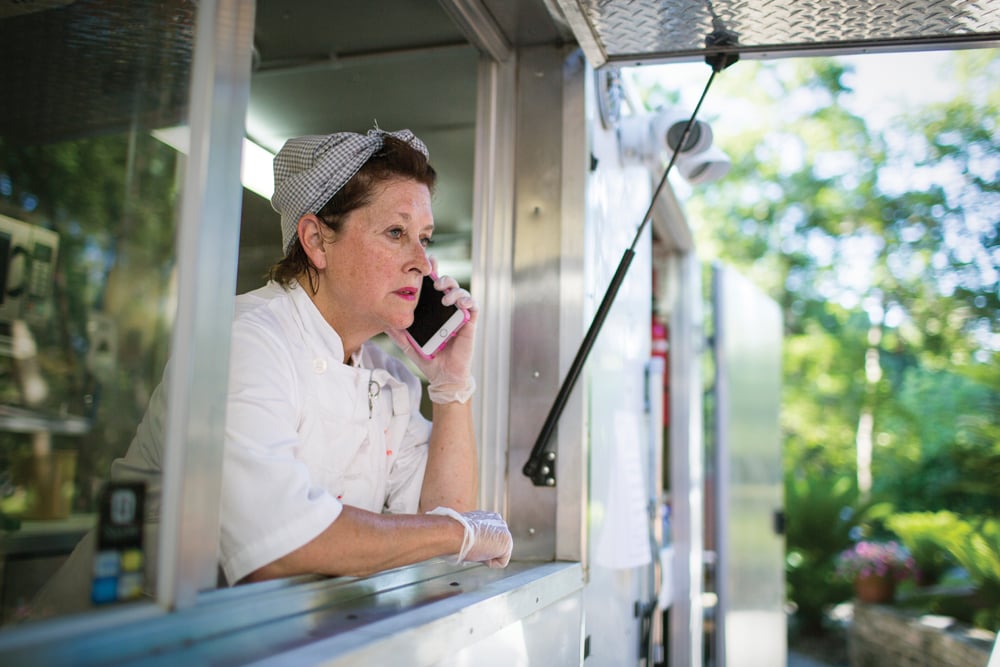
Doing the Lord’s Work
A San Antonio woman is counting on Texas’ Religious Freedom Restoration Act to trump a local ordinance that could end her decade-old ministry of feeding the needy.
A version of this story ran in the July 2015 issue.
Above: Joan Cheever is the founder of The Chow Train, a nonprofit food truck in San Antonio that feeds restaurant quality and healthy meals to the needy.
Joan Cheever’s sharpest weapon is not one of the knives in her well-equipped food truck. Nor is it her tongue, despite what she often laughingly claims. Her sharpest weapon is her mind, a razor-sharp intellect tempered in the fires of human compassion, a family tradition of service, and a passion for justice for those on the margins of society.
All this came into play the night of April 7 in Maverick Park in San Antonio, when San Antonio police gave Cheever a ticket as she was feeding the homeless, a citation that carries a $2,000 fine. The story of the incident quickly went viral and led to global outrage.
Since then, Cheever has received emails and contributions from supporters all over the world. A typical message is this one, from Joey the Horse and Kevin from ManureProject.com in Goshen, New Jersey: “There are no words to even try to explain why a society like ours would do such a thing to you. … But the important thing is you are doing good work and they cannot stop you!”
Donations from supporters in Azerbaijan, Australia, Canada, Hong Kong, Germany, Ireland, Mexico, Norway, Sweden, Thailand, the United Kingdom and every state in the union total about $30,000.
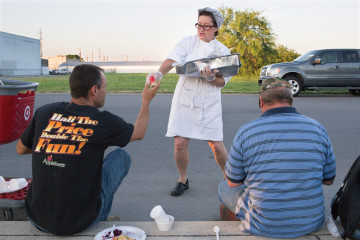
As the officer was writing the ticket, Cheever invoked the protection of the Texas Religious Freedom Restoration Act, a 15-year-old state law signed by Gov. George W. Bush that has been supported by Texas Baptists’ Christian Life Commission, the Texas Association of Business and the American Civil Liberties Union. These groups support the act because it protects religious freedoms while also neatly balancing civil rights and government interests.
Similarly named laws passed this spring in Indiana and Arkansas drew national attention because they did neither of those things. They extended the definition of “person” to include businesses, and they included no civil rights protections. The resulting national outrage over the specter of legalized discrimination against lesbian, gay, bisexual and transgender people forced both states to change their laws and to clarify that businesses could not discriminate on the basis of sexual orientation or gender identity.
Congress passed a Religious Freedom Restoration Act in 1993 with unanimous approval in the House and 97 votes in the Senate. President Bill Clinton signed it into law. Neither the federal law nor its Texas counterpart was intended as a vehicle to discriminate against anyone. They were designed to keep government from discriminating against religious Americans.
Cheever has a trial date later this summer, and the outcome could have implications beyond her $2,000 ticket. Her case is one example of how well-intended people of faith depend on these laws for precisely what they were meant to do: protect them from an overreaching government.
A spokeswoman for the city of San Antonio emphasized that Cheever was ticketed for serving food from a vehicle that had not been inspected by the city health department—not for feeding the homeless, as it’s been characterized. “Our public health safety code is in place to ensure that all people in San Antonio, homeless or otherwise, are served safe food,” said Di Galvan, director of communication and public affairs.
That nuance isn’t the issue for Raymondo Llamas, 60, who has lived on the streets off Austin Boulevard for the last 20 years. “They are doing the Lord’s work,” he said of Cheever and her team. “That’s what they are doing. I love these people. These people have helped us out many times, and they’re good people and they always help out the homeless.”
Cheever is no mere well-intentioned purveyor of bologna sandwiches. She is the founder of the nonprofit Chow Train, a fully permitted food truck from which she has fed San Antonio’s hungry for 10 years. Cheever is a trained chef who earned an associate’s degree in culinary arts from St. Philip’s College, and she even appeared on celebrity chef Rachael Ray’s cooking show in December 2014 to talk about what inspired her to found the Chow Train. She also is a food-safety-certified food handler—by both the state of Texas and the city of San Antonio—who provides three-course, high-quality hot meals made of fresh ingredients to all comers.
The Chow Train essentially is a commercial kitchen inside a big trailer pulled by a large pickup truck. Together, the truck and the trailer are about 24 feet long, and simply won’t fit in some of the places where Cheever feeds the hungry.
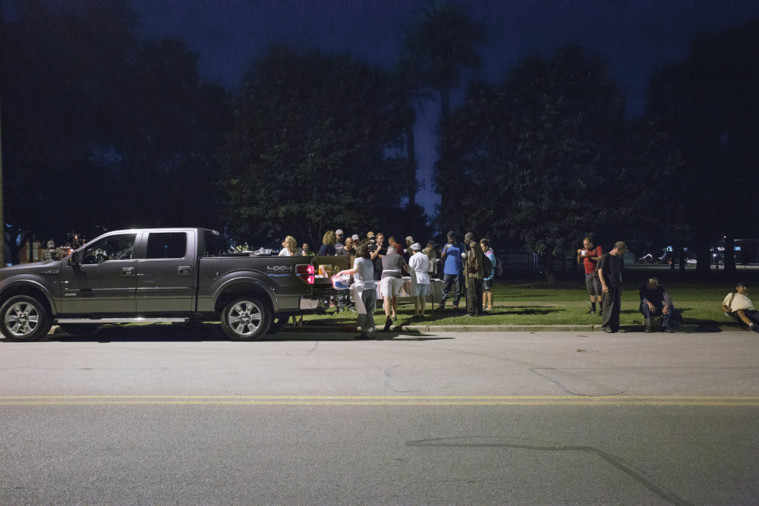
She prepares the food inside the Chow Train. Then she and her volunteers, who include her husband, Dennis Quinn, carefully wrap it up in Health Department-approved containers that keep chili and rice hot and salads cold. (Cheever is obsessive about proper food temperatures.) They pack the containers in a big slide-out tray in the back of a pickup that sometimes pulls the Chow Train, pull a metal cover over it and start their rounds.
I asked city officials whether the health department inspects all the vehicles that deliver pizza. Galvan told me that vehicles that are used only to deliver pre-ordered food from a commercial permitted kitchen to a specific person or location do not require inspections. If the food is not prepared in the transporting vehicle, then the kitchen where the food is prepared would also need to be inspected and permitted. If a vehicle is vending food (selling or giving it away) to the public, that vehicle is considered a mobile food establishment and it needs to be inspected and permitted for food safety standards.
On a recent night, the menu was farmer’s vegetable soup, Frito pie over rice with cheese and sour cream, garden salad with roasted beets and balsamic vinaigrette, bread, and for dessert, grapes with animal crackers and chocolate sauce. They now also offer high-quality dog food, after spotting several homeless dog owners feeding their food to the dogs. “That’s not good for the dogs or the people,” Cheever said. “We want the people to eat the food. But we don’t want the dogs to go hungry, either.”
The night she was ticketed, Cheever was serving fresh vegetable soup, lamb meatballs over wheat pasta, braised Southern greens, and a salad with roasted beets. She and her volunteers had just begun when four officers on bikes appeared. This wasn’t unusual; officers often stopped by to ask what was on the menu. But on this night one of them said, “You’re breaking the law.”
Cheever asked what the crime was. She told the Observer that there appeared to be some confusion about that, and the officer had to call his supervisors for clarification. He eventually gave her a ticket that reads, “Violation of 13.62–Permit Required.” Chapter 13 of the city code covers food and food handlers. The Chow Train is fully permitted, but that night they were serving the food from the back of the pickup.
“Officer, this is the way I pray. I pray while I cook. I pray while I serve. This is my prayer.”
Cheever, who is also an attorney, told the officer, “I have two federal laws, a federal court order in Dallas, and a Texas law that trumps your ordinance.” She was referring to the First Amendment, the federal Religious Freedom Restoration Act, a federal court decision in Dallas—Big Hart Ministries v. City of Dallas—and Texas’ Religious Freedom Restoration Act.
The police officer said, “Lady, if you want to pray, go to church.” The quote swiftly made its way via social media across the United States and then to other countries, as did Cheever’s reply: “Officer, this is the way I pray. I pray while I cook. I pray while I serve. This is my prayer.”
She got a ticket anyway.
The location of the showdown is as much a character in the story as the human participants. Maverick Park sits only blocks from the city’s famed River Walk and a five-minute drive from the Alamo. Its 3 acres of trees and lawn were donated to the city in 1881 by Sam Maverick, a land baron famous for not branding his cattle; because of which, unbranded cattle in the area were suspected of being Maverick’s. Eventually “maverick” evolved to mean someone who doesn’t bear anyone’s brand—a fitting description for Cheever.
Another major player is the city of San Antonio, whose leadership is invested heavily in the success of Haven for Hope, a $100 million facility built in 2010. It consists of 15 buildings on 37 acres west of downtown. Its two major components are Prospects Courtyard, an uncovered cement area designed to offer “safe sleeping for the chronic homeless population [that] sleeps approximately 500 men and women per night,” according to the organization’s website, and the Transformational Campus, “a center that offers services and shelter with an emphasis toward addressing the root causes of homelessness.” Haven for Hope was the brainchild of San Antonio business and civic leader Bill Greehey and former Mayor Phil Hardberger. Its board of directors has representatives from NuStar Energy, H-E-B, USAA, retired military, and local universities.
The city has made very clear that its goal with Haven for Hope is to bring in as many homeless as possible. One method is through the ticketing of offenses related to being homeless: Between January 2013 and early October 2014, the San Antonio Police Department gave out more than 12,000 citations for such offenses as camping in public, lying in the right of way of others, aggressive panhandling, littering, spitting, urinating or defecating in public, or disorderly conduct. Officers are trained to urge those they cite to go to Haven for Hope. Like that of most major cities in Texas, San Antonio’s homeless population is believed to be from 2,500 to 3,000, including people who sleep at Haven for Hope.
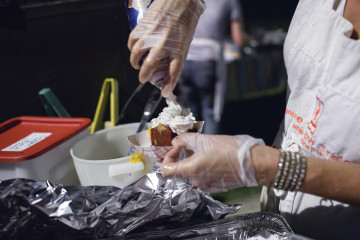
The catalyst for the story of course is Cheever, a lawyer, former managing editor of The National Law Journal, a Roman Catholic, and scion of one of San Antonio’s more prominent families. She is one of six children of Charles E. Cheever Jr. and his wife, Sally McKinney Cheever, and the granddaughter of Col. Charles E. Cheever Sr. and his wife, Elizabeth Cheever. In 1941, Charles Sr. and Elizabeth founded Broadway Bank in Alamo Heights, the city’s first suburban bank. When the colonel went off to Europe during World War II to serve as a judge advocate for Gen. George S. Patton, Elizabeth permanently took over operations at the bank. When Charles Sr. returned, he took a job at USAA, a financial services company founded by and for military officers, where he eventually served as CEO. Joan Cheever’s father, Charles Jr., succeeded his mother as head of the bank. After he retired, Joan Cheever’s brother-in-law became chairman and CEO. To say that the Cheever family is civically prominent in San Antonio is an understatement.
Cheever grew up Roman Catholic, but attends church only occasionally. She once asked one of her good friends, a priest, “So where would you rather me be on Sunday—on the streets serving or in the pews listening?” He told her, “You make this hard, Joan.” So she asked, “What would Jesus want me to do?” He replied, “You already know the answer to that.”
Some of the people Cheever feeds are homeless. Some are children, some are elderly. Some are working poor. Some are mentally ill, and some are people who have simply hit a rough patch.
The city has made very clear that its goal with Haven for Hope is to bring in as many homeless as possible. One method is through the ticketing of offenses related to being homeless.
“It doesn’t matter if they are gay or straight or transgendered or bisexual, or Jewish or Catholic or communist or Buddhist,” Cheever said. If you are hungry, she will feed you. The Chow Train’s motto is “Fighting Hunger. One Plate at a Time.”
Right now, Texas’ Religious Freedom Restoration Act is an ally in that fight, as it has been in fights involving other powerless or marginalized groups and individuals. It was used in 2009 to help a Native American kindergarten student punished by the Needville Independent School District for wearing his hair in traditional braids. Courts told the school district to back off; how he wore his hair was part of the practice of his religion.
It was used again in 2009 to protect the right of a Santería practitioner in Euless to engage in the ritual slaughter of animals. And while animal sacrifice isn’t as endearing a cause as a kindergartener in braids, the point is that the Religious Freedom Restoration Act protected a small, marginalized group’s right to carry out spiritual practices important to their faith without interference from the state.
If extremists are allowed to mold the Religious Freedom Restoration Act into a weapon of discrimination instead of a tool of protection, the losers will be vulnerable populations of all kinds, including the homeless.
Count Cheever among those who do not want to see that happen.
Cheever’s statement, “This is the way I pray. I pray while I cook. I pray while I serve. This is my prayer,” is a centuries-old theological concept, expressed best by St. Benedict: “Whatsoever good work you undertake, pray earnestly to God that He will enable you to bring it to a successful conclusion.”
Indeed, watching Cheever and her team of volunteers at work is like watching prayer in action. They know most of the people they serve and call them by name—Ed, Grandpa, Billy. They worry if a regular such as Billy, who suffers from seizures, doesn’t show up. They look each person in the eye as they serve them plates of hot food. They eat with the people they serve. They listen to them talk about what has happened since the week before: One man had been in the hospital; another’s friend was sick, so they made him a to-go plate. They will even hand-feed the disabled, gently spooning soup into the person’s mouth.
The people they feed respond in kind. They line up in an orderly fashion to be served. They are careful to let “newbies” get in line first. Seconds are always available, but they are careful to check that everyone has been served once before coming back for more. And each and every person says “Thank you” or “God bless you.”
Cheever’s husband, Dennis Quinn, makes the rounds with trays of bread and desserts, making sure everyone has gotten enough. Desserts of fresh grapes with animal crackers and chocolate sauce also are taken around on trays, and people can take more than one if they want. On a recent unseasonably chilly evening in late April, he also noticed one young man shivering in a T-shirt and shorts. He quietly followed him to the edge of the crowd and gave him a gray fleece that he had earlier loaned to a reporter who was accompanying them on their rounds.
As people begin to finish their meals, Quinn or another volunteer will walk through with a trash bag. Once everyone has eaten, the volunteers quietly make sure all trash has been collected and disposed of. The people they feed are very careful not to drop trash on the ground. Food containers are closed, leftovers are carefully wrapped and sent to the Catholic Worker House, and the back of the pickup truck is pulled shut.
Hugs and goodbyes are exchanged, and Cheever and her crew pull away as the people they’ve fed begin to disperse. By 10 p.m., Maverick Park is clean and quiet.
Cheever’s simple requirements for those she serves—if you are hungry she will feed you—run headlong into new legislation aimed at solving the problem of homelessness, especially in cities with warmer climates, such as San Antonio. The National Coalition for the Homeless reports that since January 2013, 21 cities have passed measures aimed at restricting the feeding of the homeless. The idea is to get rid of the people whose services “enable” homelessness, which would either force homeless people to leave the city or get off the street and into shelters.
Hugs and goodbyes are exchanged, and Cheever and her crew pull away as the people they’ve fed begin to disperse. By 10 p.m., Maverick Park is clean and quiet.
Melody Woosley, director of the San Antonio Human Services Department, told the Observer, “We want to do everything we can to connect our community’s homeless residents to services that can help to increase their stability and help them toward permanent housing. We have recommended that Ms. Cheever and other organizations interested in helping the homeless collaborate with Haven for Hope to magnify the positive impact of their work.”
Haven for Hope has clear, stringent requirements for those it services. The city claims that Cheever is “dangerous” to the homeless because she is keeping them from accessing services. “I’m not keeping anybody from any services,” Cheever said. “First of all, there’s a waiting list. I understand there’s a residency requirement. They have between 300 and 500 people sleeping on a concrete pad outside next to an active rail yard, and they tell me I’m not treating people with dignity.”
Cheever is considering using the hashtag #chefdanger on Twitter to highlight the silliness of the city’s arguments. “The health department told me what I was doing was dangerous and I was dangerous to the homeless community,” Cheever said, “and they said I need to serve granola bars instead of a hot meal. And I was like, ‘You’ve got to be kidding—granola bars in a city that’s battling obesity and diabetes?’ And you know, what’s wrong with a hot meal? I’m food-safety certified, and I’m [working] in health department [approved] catering equipment.
“Their issue was that I didn’t bring the [Chow Train]. But I’ve been doing that for six years. … One of the reasons that I refuse to bring the [Chow Train] is because that means that every other nonprofit or church or good Samaritan has got to go out and buy a $50,000 truck. You know, it’s crazy.”
Cheever isn’t alone in marveling at the tortured thinking of city leaders. San Antonio Express-News columnist Gilbert Garcia attended and wrote about the April 19 briefing of the San Antonio City Council’s Quality of Life Committee on the issue of homelessness, held in the wake of Cheever’s ticketing.
Garcia told the Observer, “The city wants to direct the homeless to Haven. Many don’t want to go. The city has used the food code as a way of shutting down the feeders so the homeless won’t congregate where the feeders are.” He noted that Maverick Park is nowhere near Haven. “She’s going where they [the homeless] are and feeding them there.”
Mundo Salinas, 56, said he has depended on Cheever for about two years. “I’m homeless again. I didn’t want to be, but it just happened. I try to come here every Tuesday night. I feel like it’s my family,” he said. “They take care of me. I don’t have any family here in San Antonio.”
Billy Zaniboni, 60, says Haven for Hope isn’t for everyone. “I went to Haven for Hope but I couldn’t stay there,” he told the Observer. “Things started winding up missing. I stayed there two days and I walked right out. … I said ‘I’m, better off going over to that tree. I don’t have to sleep with one eye open.’ Down there it’s not really good, unless you want to buy some drugs and get neglected. I get more help here. People, they help you.”
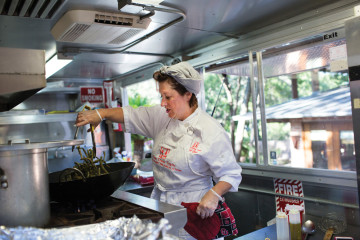
Garcia pointed out that after the officers cited Cheever, they allowed her to continue serving food that night. That, said Garcia, showed the hollowness of the whole incident. “The city claims the emphasis is one of food safety,” he said. “There is a denial that it was to crack down on feeders. One city staffer said the homeless deserve the same food safety as the rest of us. Why would they let her continue to feed them if food safety was really the issue?”
He said that Cheever has been doing the same thing the same way for years on Tuesday nights, in full sight of police officers, with no action taken. The only thing that changed was the city’s response.
Cheever said that she always has spoken favorably about Haven and continues to support its work. “I thought we were partners,” she said. “I serve the people they can’t serve; I serve people who for one reason or another, they have mental problems, they don’t want to go over there, they feel like it’s a prison. I serve our military vets.”
Cheever and other advocates for the homeless say that criminalizing homelessness is not only inhumane, it’s ineffective. There already is a waiting list at Haven for Hope. Cheever says that if she is enabling someone to live one more day with a hot, nutritious meal, then yes, she will enable them.
“It started with the Chow Train, but it’s not about the Chow Train,” Cheever said. “The issue is, they want the homeless to go to one place—Haven for Hope, which I have no problem with; they apparently have a problem with me.”
“I’m humbled and grateful. I know the people of San Antonio are behind me. Nobody wants to turn their back. And all of us are raised to help someone in need.”
And if the court rules that she can no longer help people in need? Cheever will handle that if it comes. For now, she believes Texas’ Religious Freedom Restoration Act is on the side of those carrying out the Gospel imperative to feed the hungry.


